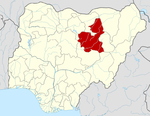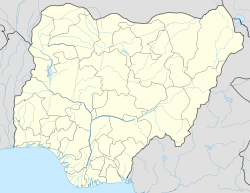- Ningi, Nigeria
-
Ningi, Nigeria Location in Nigeria Coordinates: 11°4′N 9°34′E / 11.067°N 9.567°E Country  Nigeria
NigeriaState Bauchi State Ningi is a town, a local government area, and an emirate in Bauchi State, Nigeria. The Ningi emirate comprises two local government areas, Ningi and Warji, with a combined area of 5,250 km2 and a population of 501,912 according to the 2006 Census. The Ningi local government area covers an area of 4,625 km2 with a population of 387,192 at the 2006 Census. The area is inhabited mostly by Fa,awa, Warjawa, Duwa, Ningawa and Fulani people. Yunusa Mohammadu Danyaya is the current Emir of Ningi.
Contents
History
Ningi state was founded by an enclave of Islamic scholars known as the Mallams in the 18th century (around 1827) under the leadership of Hamza. Ningi leaders were hitherto called Mallams until early the 19th century. Fa,awa are the first tribe to gain the benefit of western education, but the remaining tribe came to ningi as visitors and they remain due to the abundant food item provided by Fa,awa people.
According to legend, Hamza migrated with forty other Mallams and their families from Tsakuwar Kano, in the present day Dawakin Kudu Local Government Area of Kano State, in 1827. They settled eastward at Mara in the present day's Lame district of the Toro, Nigeria local government area in Bauchi State. The Mallams were protesting the payment of a tax called Kudin Kasa in the Kano Emirate during the reign of Sarkin Kano Mohammed Bello. While at Mara, Sheikh Hamza used his Islamic knowledge and dexterity to convince the local people under their leader called Dandaura to break their allegiance of the Amanah Agreement; entered into with the Fulani Emirate in which they paid tribute (jizya) to the leader. By 1830, in order to change the status quo, Hamza had to crush Dandaura and remain the undisputed leader. He immediately brought all the neighboring stateless societies, especially the Butawa, Fa'awa, Warjawa, Kudawa, Sirawa, under his control. This act became a threat to the peace and security of the neighboring emirates of Bauchi, Kano, and Zaria. As a result, Bauchi and Kano combined their forces and launched an attack on Hamza.
With the death of Hamza, the people suffered from the loss but remained organized and selected Ahmadu in 1850 to be their leader. He reigned for five years and died in 1855. The people chose Hamza's son-in-law, Abubakar Danmaje, as the next leader. Unlike his predecessors, Danmaje started an expansionist policy and devised very effective raiding strategies. He raided far and wide to Kano, Hadejia, Katagum, Jamare, Gombe, Zaria, Birnin Gwari, Kontagora, Wukari, and even Illorin. Danmaje found it necessary to raid so as to recruit slaves into his ranks. The result was the creation of a strong, formidable, and insurmountable force with commanded by him. This force was known as Mai Tabaryar Mashi.
Apart from the expansion of the territory and establishment of a powerful force, the Danmaje reign was significant for the movement of the people to the old Ningi, situated in a strategic and frontier position surrounded by hills. It was the obscure location of the place that earned Ningi its name, which in the Butawa language means "hiding place." With such a strategic position, Danmaje continued the campaign by intensifying his sporadic raids. In fact Bauchi feared Danmaje so much that the emir of Bauchi, Ibrahim had to establish Kafin-Madaki; with the sole aim of preventing him from entering Bauchi. Kafin Madaki was however to serve as a dog watch with the specific instruction of not confronting Danmaje but quickly reporting any move made by the Ningawa to raid Bauchi.
After Danmaje's death in 1870 his successor, Haruna Karami, continued the expansionist policy with the strong backing of his able lieutenant Usman Danyaya, the then barden of Ningi. Haruna died in 1886 and Abubakar Gajigi was appointed the leader. Abubakar maintained Ningi's struggle to survive as a state of its own without losing any territory to the neighboring emirates.
Then came the reign of Usman Danyaya. Considering its history as an independent state with an organized system of administration based on Islamic provisions, the British modernized the system by making Ningi a native authority. By this act Ningi became one of the few areas to be made a native authority the very year the British came into the administration of northern Nigeria.
Usman was succeeded by Mamuda, who was under the guidance of the British. This continued with Musa Dangwido (1905–1906) and Mallam Mamuda again (1906–1908). Adamu Danyaya was the longest to reign as the Emir of Ningi, having ruled for 32 years. The present Emir Yunusa Mohammadu Danyaya, who came into power in early 1978, is so far the second longest reign; having ruled over 30 years now.
List of rulers
- Hamza – 1827–1850
- Ahmadu – 1850–1855
- Abubakar Danmaje – 1855–1870
- Haruna Karami – 1870–1886
- Abubakar Gajigi – 1886–1890
- Usman Danyaya – 1890-1890
- Mamuda Lolo – 1902–1905
- Musa Dangwido – 1905–1906
- (Restoration of) Mamuda Lolo – 1906–1908
- Abdu mai Fatima – 1908–1915
- Zakari Dankaka – 1922–1955
- Adamu Danyaya – 1922–1955
- Haruna II – 1955–1957
- Abdullahi Adamu Danyaya – 1957–1961
- Ibrahim Gurama – 1963–1977
- Yunusa Mohammadu Danyaya – 1978–current
See also
- Gamo-Ningi – An extinct language of Nigeria[1]
External links
- Hardawa, Mu’azu (November 28, 2006). "2007: Ningi joins presidential race". Nasarawa Publishing Company Limited. http://www.nasarawastate.org/newsday/news/nasara06/NewArticle431.html.
- "Women face death by stoning over sex". Reuters. October 14, 2004. http://www.smh.com.au/articles/2004/10/13/1097607302256.html.
References
- ^ Gordon, Raymond G. (2005). "Ethnologue report for language code:bte". SIL International. http://www.ethnologue.com/show_language.asp?code=bte.
Coordinates: 11°04′N 9°34′E / 11.067°N 9.567°E
 Bauchi State
Bauchi StateState capital: Bauchi LGAs  Categories:
Categories:- Populated places in Bauchi State
- Local Government Areas in Bauchi State
Wikimedia Foundation. 2010.

